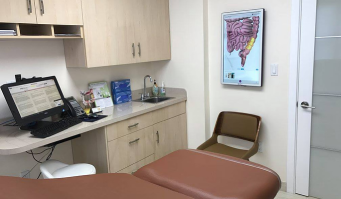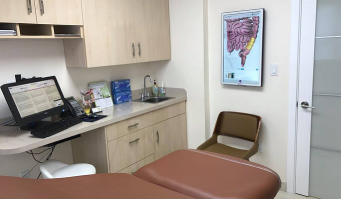Crohn’s Disease
- Voted Top Doctors In NYC
- Award Winning, Board Certified Physicians
- Utilizing Latest Technology
What Is Crohn’s disease
Crohn’s disease is a chronic inflammatory condition affecting the digestive system. It can occur anywhere along the digestive tract, but most commonly involves the small intestine and colon (large intestine). Crohn’s, along with ulcerative colitis (UC), are classified under the umbrella term inflammatory bowel disease (IBD). While a cure for Crohn’s remains elusive, effective treatments exist to manage symptoms and facilitate a full, active life.
Causes of Crohn’s Disease?
The exact cause of Crohn’s disease remains a mystery. While some theories consider it an autoimmune disease, others suggest a more nuanced interaction. Research indicates that chronic inflammation might not solely stem from the immune system attacking the body itself, but potentially from its overreaction to harmless viruses, bacteria, or food within the digestive system.
Symptoms of Crohn’s Disease
People with Crohn’s disease can have intense symptoms, followed by periods of no symptoms that may last for weeks or years. The symptoms depend on where the disease happens and how serious it is.
What are the first signs of Crohn’s disease?
Early signs of Crohn’s disease can easily be mistaken for other conditions. They may include:
- Frequent diarrhea
- Abdominal pain
- Unexplained weight loss
- Blood in your poop
Other symptoms of Crohn’s disease
When it advances, you might notice:
- Nausea
- Tiredness
- Joint pain
- Fever
- Long-lasting diarrhea, often bloody and with mucus or pus
- Weight loss
- Mouth sores
Diagnosis of Crohn’s Disease
- Bloodtests
- Stool samples
- MRI
- CT scan
- Endoscopy
- Balloon-assisted enteroscopy
- Capsule endoscopy
- Upper endoscopy
- Colonoscopy or sigmoidoscopy
Treatment of Crohn’s Disease
Crohn’s Disease Treatment:
While no single treatment works for every individual with Crohn’s disease, therapy is tailored based on individual symptoms and disease severity. The primary goal is to reduce inflammation within the digestive tract and prevent complications.
Medications
- Anti-inflammatory drugs
- Corticosteroids
- Immunomodulators
- Antibiotics
- Antidiarrheal medications
- Biologic medicines
Treatment Monitoring and Maintenance:
After initiating treatment, your doctor will monitor its effectiveness at regular intervals. Once remission (symptom-free state) is achieved, “maintenance therapy” will likely be prescribed to prevent symptom recurrence. If improvements aren’t observed, stronger medication or surgery might be considered. Nutritional supplements may also be recommended.
Surgical Interventions:
Approximately 66%-75% of individuals with Crohn’s disease require surgery, either due to complications or inadequate medication response. Common procedures include:
- Resection: This procedure removes the diseased portion of the bowel and reconnects the healthy ends. While many patients experience symptom relief for years, Crohn’s disease often reappears at the connection site (anastomosis).
- Ileostomy: If the rectum is severely affected, an ileostomy might be necessary. This procedure connects the intestine to an opening in the abdomen, where waste collects in a pouch for emptying.

“Thank you for visiting Forest Hills Gastroenterology & Liver Disease, my goal is to treat my patients in a highly personalized manner and I am dedicated to give you the utmost attention and respect that you deserve. For more infromation on this disease or to schedule a consultation with me, please give us a call or book a tele-health appointment online.”
Albert Shalomov
Dr. Albert Shalomov, MD
Disclaimer: Educational Infromation, Not Medical Advice
It’s important to remember that the information provided here is intended for educational purposes only and should not be misconstrued as definitive medical advice. Always seek the guidance of a qualified gastroenterologist for accurate diagnosis and treatment of any specific gastrointestinal condition. Only trained healthcare professionals can provide personalized recommendations and ensure your well-being.




